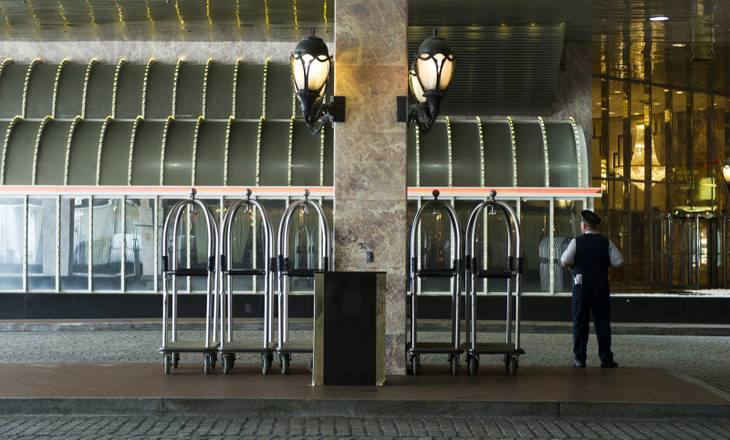ATLANTIC CITY — Over the Fourth of July weekend, this town was packed. Hotel occupancy soared to 95 percent and shoppers coursed through the outlet stores opposite Trump Plaza. At Revel, the city’s newest resort, the lively, dressed-up crowd gazed out through the floor-to-ceiling glass to see the surfers riding the day’s last waves onto the wide beach.
But the booming weekend belied the wrenching problems plaguing this New Jersey resort. In the winter and even midweek in the summer, Atlantic City — battered by storms, declining property values and, increasingly, crushing competition from gambling operations in neighboring states — is relatively quiet.
Since January, four of the city’s 12 casinos have announced plans to shut down if they fail to find buyers. In the latest blow, workers at Trump Plaza Hotel and Casino received notices that the white-towered complex with the bright red letters was expected to lock its doors as soon as Sept. 16. The Atlantic Club is already closed, and Showboat and Revel would close in late summer. The four represent 25 percent of the city’s casino workforce: more than 8,000 jobs that could be lost, according to union leaders.
The remaking of Atlantic City’s defining industry is driving a furious effort to reimagine what this beach town can be now that casino gambling has a foothold in neighboring states and may even be permitted in northern New Jersey. Gamblers who once crossed state lines to get to Atlantic City are now staying closer to home, playing at 20 casinos or slot parlors in Delaware, Maryland, New York and Pennsylvania. And more competition is coming.
Survival will depend on reinvention, again — a notion the mayor, Don Guardian, energetically embraces.
“Atlantic City is resilient,” Guardian said. Over 160 years, he added, “it’s gone from a health resort to the world’s playground with liquor during Prohibition, to a convention city and then a gambling monopoly, at least on the East Coast.”
“It’s time,” he continued, “to open another chapter.”
Guardian and Gov. Chris Christie have come up with a vision for Atlantic City as a convention mecca, a college campus, a tech center and, yes, a gambling destination, although a smaller one, with perhaps a half-dozen casinos. But the transition is not happening as fast as the wrenching resizing of the city’s gambling industry.
The mayor and the governor are embarking on a path forged by Las Vegas 15 years ago. Today, gambling accounts for only 30 percent to 35 percent of revenues at Las Vegas casinos. Entertainment, restaurants and retail make up the difference.
In Atlantic City, gambling still generates 71.5 percent of the revenues, down from almost 78 percent two years ago. Simply put, there are just too many slot machines, blackjack tables and poker rooms.
“It comes down to saturation,” Guardian said. “How many more casinos do you think you can build in the mid-Atlantic states?”
The state, the city and the casinos count their victories in developing attractions — new restaurants with celebrity chefs, shops, nightclubs and beach concerts — for tourists who may never push a button on a slot machine or bet on the roulette wheel.
The city is now a stop on the ultramarathon circuit. Lady Gaga played a sold-out concert on the boardwalk in June. More than 130,000 visitors attended the World Championship of Sand Sculpting there last year.
And bulldozers and wrecking balls do not necessarily follow a casino closing.
The Claridge casino has been reborn as a stand-alone hotel, and its casino floor may soon be home to a children’s museum and banquet space. TJM Properties, which owns the Claridge, also bought the Atlantic Club, where there is talk of installing a Hollywood Hall of Fame and Latitude 360, an entertainment complex.
Nongambling revenues in Atlantic City are up $162 million in the past two years.
Yet, gambling revenues are falling nearly twice as fast, down about $2.8 billion since 2006.
“The challenge for Atlantic City is about accelerating the pace of change,” said Elizabeth Cartmell, president of the Atlantic City Alliance, a marketing agency with a $30 million annual budget funded by the city’s 11 casinos, essentially tax revenue once used elsewhere in the state. “Right now, we’re losing gaming revenue faster than we’re gaining nongaming revenue.”
The city of about 40,000 still has the foreboding, gaptoothed landscape that characterized it even during the boom years for casinos, especially in the northern neighborhood surrounding the Revel and Showboat casinos. Sturdy brick houses off Atlantic Avenue stand next to broad vacant lots and abandoned buildings. The unemployment rate in the area is just above 10 percent, and the average household income is about $30,000. The state has started to address some of these long-neglected problems.
Under the governor’s five-year plan, which began in 2011, the state’s Casino Reinvestment Development Authority acquired some dilapidated buildings as part of a master plan focused on increasing housing, retail, tourism and conventions within the tourist district. It has sponsored storefront improvements for shops on Atlantic Avenue, the city’s main commercial strip.
The state is also providing tax breaks and gap financing for a new outdoor sports superstore, Bass Pro Shop, under construction on Atlantic Avenue, as well as a $126 million conference center at Harrah’s casino.
But some of Christie’s initiatives have not borne fruit. In 2011, he pledged up to $260 million in tax breaks to get construction to resume on the $2.4 billion Revel resort.
Visitors describe the glass-walled tower and its interior as “beautiful,” and it is home to the city’s most popular nightclub.
But it never made money, and it filed for bankruptcy protection for the second time in June.
The governor also proclaimed online gambling, conducted by the casinos, as a boon for Atlantic City last year, but it has generated only a fraction of the $1 billion that he once predicted.
The latest threat to Atlantic City comes not from rapidly proliferating gambling operations in other states but from within the state itself.
News broke last week of billionaire Paul Fireman’s proposal for a 95-story tower in Jersey City, whose centerpiece, proponents say, would be the highest-grossing casino in the United States. Jeff Gural, a New Jersey real estate executive, has been lobbying legislators for the right to build a casino north of that site, at the Meadowlands Racetrack.
“The realization has set in that there’s too much capacity in Atlantic City,” said Gural, who is competing for a casino license in New York as well as in the Meadowlands. “As the situation in New York develops, it’s time to look at putting casinos outside of Atlantic City.”
In the meantime, before his nonstop days of meetings to save the city, Guardian pedals his bike every morning along the entire 4.5-mile boardwalk, making sure the beaches have been raked and the bathrooms cleaned.

